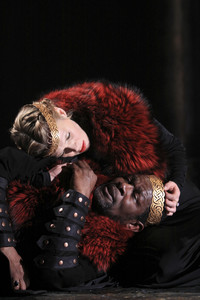
A MACBETH WITH VERY MUCH TO RECOMMEND
The interesting thing about seeing multiple productions by the same theater company and the same director is that a pattern begins to emerge. Theatre for a New Audience’s production of Macbeth, starring John Douglas Thompson, contains the same strengths and weaknesses as director Arin Arbus’s previous work with TFNA.
Mr. Thompson is a superb Macbeth. The only flaw in his performance is that he is too decisive; we should believe that there is at least a chance Macbeth will not go through with the murder of Duncan, but from the first scene of the play, Mr. Thompson leaves little doubt as to his character’s direction. Such is his strength and stage presence that he rather overwhelms Lady Macbeth (Annika Boras), whose excellent performance might have been better highlighted by a lesser actor in the lead role.
Ms. Arbus has cast three male actors as the witches, a decision well-supported textually in Banquo’s line “you should be women, and yet your beards forbid me to interpret that you are so.” Although these witches (Tommy Schrider, Andrew Zimmerman, and Saxon Palmer) bear a somewhat unfortunate resemblance to characters in a Monty Python hermit sketch, they lend a suitably creepy presence to the play. They appear not only in their own scenes, but as other characters throughout, such as the murderers of Lady Macduff and Macbeth’s servant Seyton. This gives the impression that Macbeth is constantly surrounded by evil, quiet and twitching though it may be.
 The scenic and lighting designers (Julian Crouch and Marcus Doshi, respectively), know how to use the space of the Duke on 42nd Street to its best advantage. Wisely, little furniture is used on the main thrust stage, other than Macbeth’s throne, and the thrust stage of the Duke provides the intimacy with the audience that Shakespeare’s plays require.
The scenic and lighting designers (Julian Crouch and Marcus Doshi, respectively), know how to use the space of the Duke on 42nd Street to its best advantage. Wisely, little furniture is used on the main thrust stage, other than Macbeth’s throne, and the thrust stage of the Duke provides the intimacy with the audience that Shakespeare’s plays require.
Unfortunately, the distracting double- and triple-casting of some of the other characters dilutes the effect of doubling the witches. The poor use of doubling is characteristic of Ms. Arbus’s work for TFNA, and although it certainly stems from considerations of budget, it does make the play more difficult to follow, even for audience members familiar with the plot. The doubling of Graham Winton as Banquo and Siward, and Marquis Rodriguez as Fleance and Young Siward, was particularly off-putting, as it appeared that Banquo and Fleance had simply come back to life as another father-son pairing. (Costumes, by Anita Yavich, could have done a far better job distinguishing one role from another.) Mr. Rodriguez is also cast as Macduff’s young son, and though the high-school-age actor acquitted himself very well in the fight scene, the role was clearly intended for a much younger child.
Despite these flaws, TFNA’s production of Macbeth is straightforward and quick-paced, using fine acting and little else to tell the story, which is how Shakespeare should always be played. Given the easy accessibility of this production and most others I have seen at this theater, I continue to question why TFNA always prints a page-long plot synopsis in the program. Shakespeare is not so dense and challenging that we require to know how the play ends before it even begins, and even for first-time playgoers the synopsis is surely unnecessary. Imagine having the luxury of going into one of Shakespeare’s plays without the knowledge of how it will all turn out in the end! I would encourage TFNA to discontinue this practice and leave the storytelling for the stage where it belongs; their productions are so solid that they surely need no such crutch.
arielle.lipshaw @ stageandcinema.com
photos by Gerry Goodstein
Macbeth
scheduled to close April 22 at time of publication
for tickets, visit http://www.tfana.org/season/macbeth/overview

{ 1 comment… read it below or add one }
The reviewer failed to note John Douglas Thompson’s exceedingly unnatural speech and facial patterns. He apparently lacks the diction to deliver Shakespeare’s words in a speedy yet understandable fashion. Highly distracting.
He also failed to note what happens to Annika Boras’ voice when she is compelled to speak loudly. She degenerates into an exceedingly unpleasant shrillness. Oddly, the same thing happened to Katie McLuggage’s voice in Merchant of Venice. The fault lies either with the director or the speech coach; in either event, totally unacceptable.